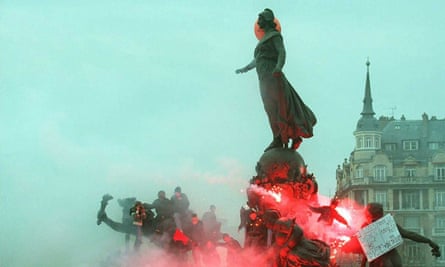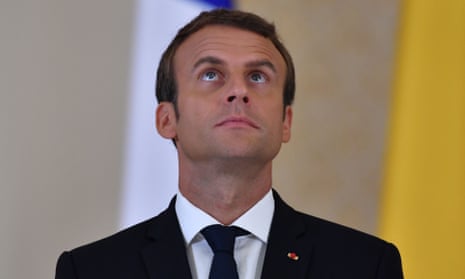The unions are threatening national strikes and blockades. A growing number of critics are warning that France is a “powder keg” waiting to blow. After an unconvincing summer, in which his popularity has plummeted, crunch time for Emmanuel Macron has arrived. The new French president is facing the prospect of a September standoff in the streets over his controversial plans to revamp the labour laws.
In his election manifesto Macron pledged to use a special presidential decree to force through measures making it easier, among other things, for employers to hire and fire.
He has a clear parliamentary majority, so the biggest menace to Macron’s plans comes from the unions and the street. The CGT trade union has called for a day of “action and strikes” on 12 September; Jean-Luc Mélenchon, leader of the hard-left party La France Insoumise (FI; France Unbowed) has called for a “day of action” two weeks later.
The stakes could scarcely be higher. Macron’s success or failure on his flagship reform will define his term in office and may make or break a nascent French economic recovery. Previous presidents have tried and failed for 20 years to make France’s weighty and hugely complex code du travail (employment code) more flexible.
In 1995 the conservative president Jacques Chirac’s prime minister, Alain Juppé, tried to modify France’s pension provisions and caused a general strike that paralysed the country. Macron’s predecessor, the Socialist president François Hollande, attempted to simplify the code, but backed down in the face of violent protests. Macron knows the history. During a visit to Bucharest last week, he told an audience: “France is not a reformable country. Many have tried and they have not succeeded because the French hate reform.”
The political scientist Frédéric Dabi, deputy director of the pollsters Ifop, said it was impossible to predict what would happen in the next few weeks. “With Macron’s popularity at such a low and the honeymoon period now gone, he has to be careful not to cause major disappointment,” Dabi said. “It’s important the he and his government don’t do anything that leaves people with a feeling of injustice. He cannot risk losing the moderate left, the Hollande supporters who fuelled his election, and he has to have a good communication strategy to explain where he is taking the French. We cannot forget that he [Macron] got only 24% of the vote in the first [presidential] round. This could rapidly coalesce into widespread discontent with him and the government. Now is the hard part and we cannot say for sure what will happen; it’s a case of wait and see.”
Last week Hollande used his first interview since leaving office to warn his successor not to impose “useless sacrifices” on French workers. The president and his prime minister, Édouard Philippe, were clearly annoyed. Macron, on a visit to Austria, responded testily: “France’s problem is that it’s had mass unemployment for 30 years … it is the only big European country that hasn’t won the battle against unemployment.” Philippe went further. “What struck me about the former president’s remarks is, basically, he wants everything to continue as when he was in power,” he told RMC radio. “The message I took from the presidential election was that the French don’t want that, they want profound change.”
The June general election gave Macron’s government a clear majority in the national assembly allowing the president to deploy the rarely used device of a presidential decree to pass the reforms. Former Socialist MP Émeric Bréhier, now director of the Jean-Jaurès Foundation thinktank’s political observatory, said there was in effect no opposition. “Macron’s popularity is even lower than François Hollande’s was at this stage, but there is no credible alternative, so Macron remains at the centre of the game.”
An outline of the proposed labour law changes, which also include capping industrial tribunal payments and allowing employers to negotiate with unions at local rather than national level – a threat to collective bargaining that is the motor of French union power – were presented to the unions last week. The government will send its draft decrees reforming the code du travail to the state council this week. The texts are expected to be published on Thursday and passed before the end of September.
Macron’s strategy appears to be to divide the unions, making minor concessions to some and marginalising the more militant CGT, which was behind last year’s more virulent protests against Hollande.
One of the more leftwing unions, Force Ouvrière (FO; Workers’ Force), has already indicated it is predisposed to negotiate and that “everything is on the table”. “We haven’t had the full details yet. We are watching out as you watch a saucepan of milk on the stove … the devil is in the details,” the FO president, Jean-Claude Mailly, said last week. Other union leaders have warned there are “red lines” in workers’ rights that cannot be crossed. One insisted they would not allow workers to be forced “back to the Middle Ages”.
Bréhier is sceptical of warnings that Macron and his government are facing a turbulent, even violent, return to work. “It will depend on the unions. If it’s just the CGT that opposes the labour laws, I don’t believe we will see many protests,” he said. There are signs that the French economy is growing and the latest drop in unemployment could temper the protests. “People are saying to themselves, ‘things are getting better, let’s give him a chance’, but the most important thing is this lack of opposition,” Bréhier said.
Mélenchon’s FI, with the support of Socialist MPs, has lodged a legal demand to have the use of a presidential decree to pass the labour law changes as “unconstitutional”. Alexis Corbière, FI spokesman, told Europe 1: “We will see what the government does. It is possible that it will be more wary than expected, it knows full well the country is a social tinderbox. The French have a passion for equality and will not accept the expected reversal of social benefits.”
The last week of August, when the French traditionally return from their summer holidays and prepare to go back to work, is known as la rentrée (the return). For Macron, la rentrée of 2017 is set to be a stormy one. It may yet come to define his presidency.
Labour reforms
Emmanuel Macron, the French president, says his code du travail reforms will “bring France into the 21st century”. His plans, which will be revealed this week, are expected to include:
Hiring Loosening tax and social charge obligations on expanding small and medium companies to encourage them to take on more staff.
Firing Limiting the amount of compensation awards from industrial tribunals.
Negotiating Firms would be able to make local agreements to adapt working hours and conditions, bypassing national union officers.


Comments (…)
Sign in or create your Guardian account to join the discussion